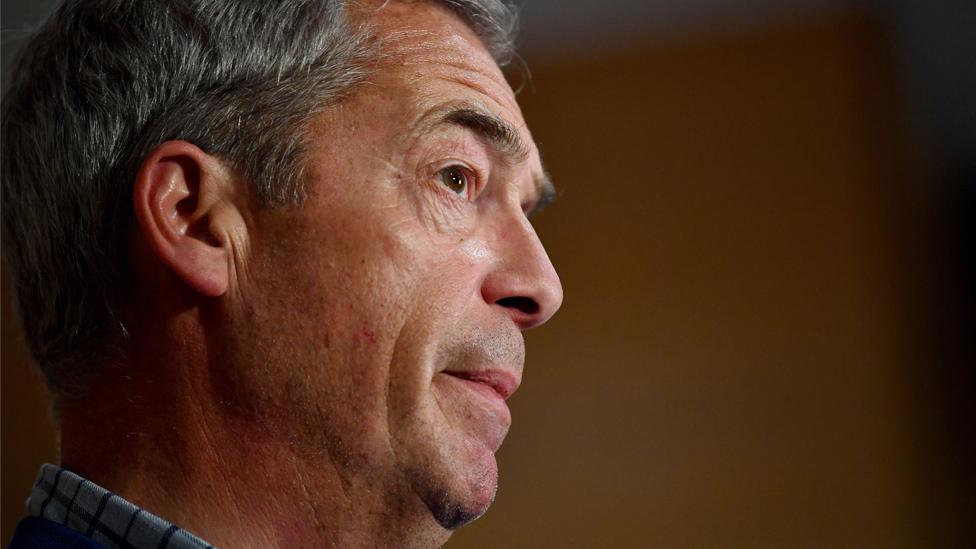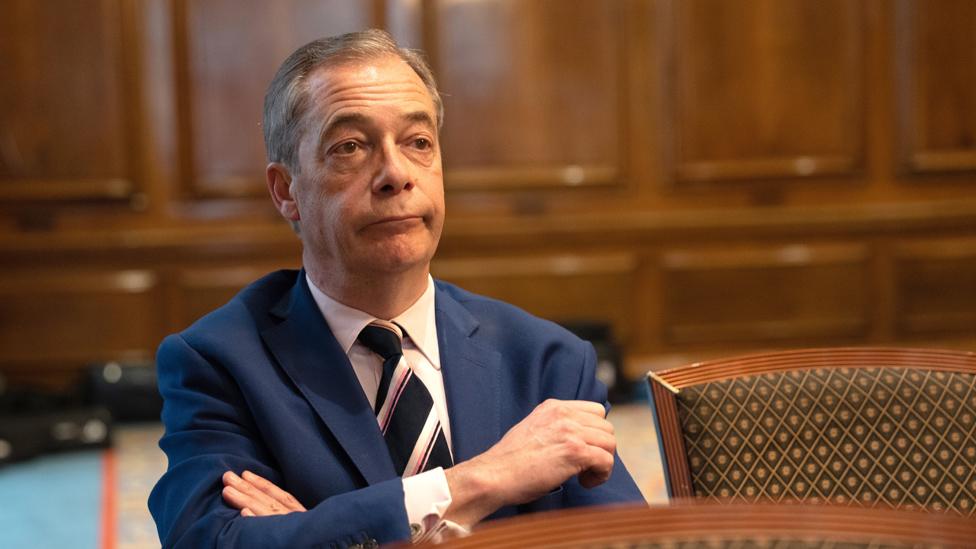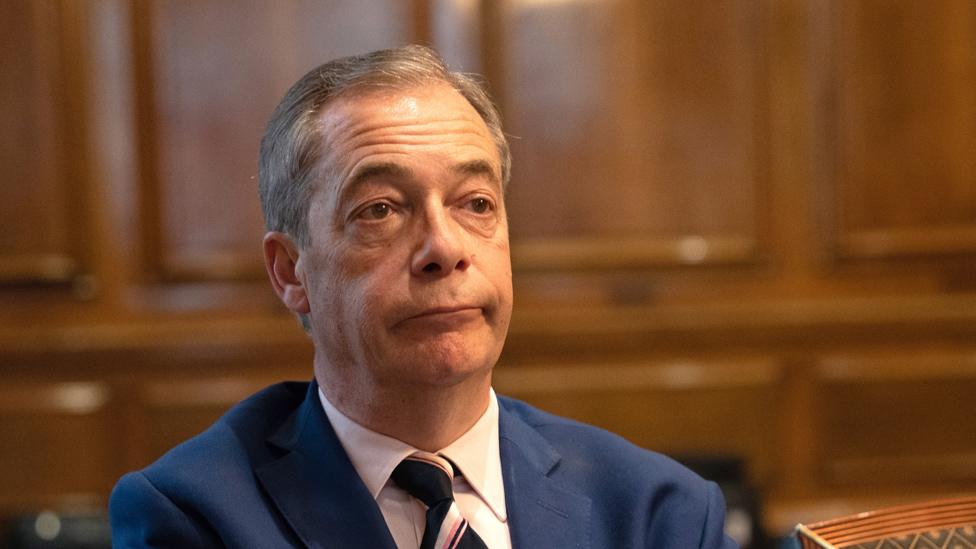Nigel Farage launches fresh attack over Coutts bank closure
- Published

Nigel Farage has launched a fresh attack over Coutts bank's decision to close his account.
The BBC had previously reported Mr Farage had fallen below the financial threshold needed for an account, citing a source familiar with the move.
Speaking on Radio 4 on Wednesday, Mr Farage said the BBC had fallen for "spin" and restated that he had been "cancelled" for his political views.
Coutts said decisions to close an account "are not taken lightly".
Earlier on Wednesday, the BBC was told dropping under the wealth threshold could prompt the bank to conduct a wider review of the customer's profile, including reputational and legal risk.
In the Commons on Wednesday, Prime Minister Rishi Sunak said it "wouldn't be right" for financial services to be denied to those expressing lawful free speech and said the government would be "toughening the rules around account closures" following a consultation.
The BBC has been told the government is preparing to announce tighter regulations on banks, which is expected to include giving customers more notice of planned account closures, and the rationale behind them, and therefore more ability to appeal decisions.
Former leader of the UK Independence Party Mr Farage spoke to BBC Radio 4's World at One after he obtained a report on Tuesday that had reviewed his suitability as a client of Coutts, and which has since been published in the Mail., external
He told the programme that the report had mentioned Brexit and his alleged links to Russia.
"Apparently, I'm a risk to them. I have virtually no links of any kind to Russia whatsoever. This is political. There is no other way of looking at it," he said.
The document also gave examples of Mr Farage's views, including his retweet of a Ricky Gervais joke about trans women and his friendship with tennis player Novak Djokovic, who is opposed to Covid vaccinations, to flag concerns that Mr Farage is "xenophobic and racist".
He said the 40-page document shows that in November 2022, Coutts' reputational risk committee "met and said, I did not align with their values, that somehow I wasn't part of their diversity and inclusion agenda and that for those reasons there should be a glide path to closing my account".
The document - which the BBC does not have a copy of - makes disclosures including:
Mr Farage had a mortgage with Coutts due to expire in July 2023 which the bank would not look to renew. "Suggest winding down the connection on that basis", it stated
It also stated that the committee did not think that continuing to bank Mr Farage "was compatible with Coutts given his publicly-stated views that were "at odds with our position as an inclusive organisation"
It states "the decision was to exit Nigel Farage"... to coincide with the expiry of the mortgage
The bank also states Mr Farage would "perceive a decision to exit him as unfair" and noted "he would almost certainly use his public platform to communicate his dissatisfaction"
It also noted "the media consequences are unknown should he choose to go 'public'"
Mr Farage said the report stated "very clearly" that he had met the bank's commercial criteria.
"For them to try subsequently to pretend that it's for commercial reasons just is not true."
He later told BBC Newsnight he was "literally shocked" when he saw the report, which he described as a "personal hit job". "This bank is behaving now like a political campaigning organisation," he said.
Economist Frances Coppola told the same programme that "having read the report, I actually don't think that's the reason why they closed his account. The report makes it clear that the reason they closed the account was that Nigel paid off his mortgage and the house was released as a security and that brought him below the criteria for an account at that bank."
The bank, owned by NatWest, says customers must borrow or invest £1m or have £3m in savings. Mr Farage previously did not dispute that he did not meet Coutts' threshold but said the bank had not had a problem with this for the past 10 years.
Call for apology
Coutts said on Wednesday it recognised "the substantial interest" in Mr Farage's case.
"We cannot comment on the detail given our customer confidentiality obligations. However, it is not Coutts' policy to close customer accounts solely on the basis of legally held political and personal views. Decisions to close an account are not taken lightly and involve a number of factors including commercial viability, reputational considerations, and legal and regulatory requirements.
"We recognise the critical importance of access to banking. When it became clear that our client was unable to secure banking facilities elsewhere, and as he has confirmed publicly, he was offered alternative banking facilities with NatWest. That offer stands," it added.
The Financial Conduct Authority (FCA) said it was discussing the situation with NatWest.
FCA chief executive Nikhil Rathi told MPs: "You'd expect that we are talking to NatWest Group about this.
"A specific adjudication on an individual case is a matter for the Financial Ombudsman Service."
He told the Treasury Select Committee: "If a complaint is made and it is determined that there has not been an appropriate consideration of this case, that would then of course be relevant for us from a supervisory perspective."
The BBC's previous report, published at the start of July, cited people familiar with Coutts' decision to shut his account as saying it was a "commercial decision".
On Wednesday Mr Farage called for the BBC to apologise, external for its previous reporting, and said he would be making a complaint.
At Prime Minister's Questions on Wednesday former Brexit secretary David Davis accused the bank of lying about the "commercial viability" of Mr Farage's account in anonymous briefings to the BBC.
Separately, Sir Jacob Rees-Mogg, the former business secretary, called for an inquiry into what happened to the Coutts bank account.
Mr Sunak's press secretary said after PMQs it would be "incredibly concerning and wrong" if Mr Farage's account was closed due to his political opinions.
"No-one should be barred from bank services for their political views," she said.
Meanwhile, Home Secretary Suella Braverman said elsewhere that this "exposes the sinister nature of much of the diversity, equity and inclusion industry".
"NatWest and other corporates who have naively adopted this politically biased dogma need a major rethink."

A HM Treasury spokesperson said: "It would be of serious concern if financial services were being denied to anyone exercising their right to lawful free speech.
"We will soon set out plans to crack down on this practice by toughening the rules around account closures, protecting freedom of expression.
"In the meantime, people can complain to the Financial Ombudsman Service which has the power to direct a bank to reopen an account."
The government since January has been taking evidence on how private companies' right to commercial independence is balanced with individuals' rights to freedom of expression.
Government insiders have told the BBC the government's view is that the balance has "tipped" too far in companies' favour.
Coutts said: "We understand the public concern that the processes for ending a customer relationship, and how that is communicated, are not sufficiently transparent."
The bank added that it welcomed the Treasury plans to prioritise the review of the regulatory rules relating to politically exposed persons.

Sign up for our morning newsletter and get BBC News in your inbox.

Related topics
- Published18 July 2023

- Published5 July 2023

- Published20 July 2023
